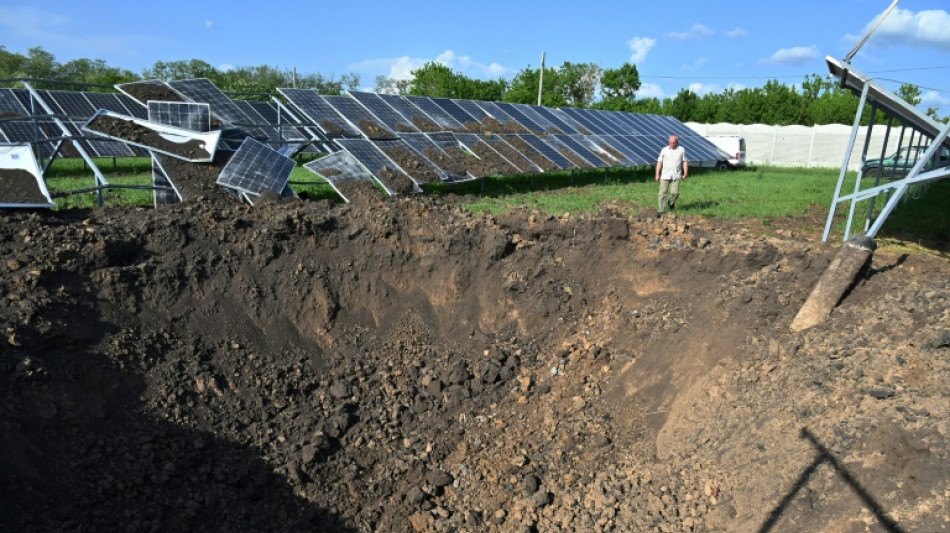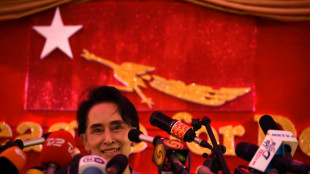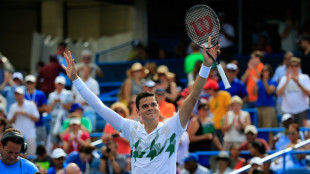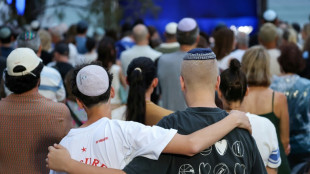
-
 Myanmar pro-military party claims Suu Kyi's seat in junta-run poll
Myanmar pro-military party claims Suu Kyi's seat in junta-run poll
-
Fed chair Powell says targeted by federal probe

-
 Trailblazing Milos Raonic retires from tennis
Trailblazing Milos Raonic retires from tennis
-
Australia recalls parliament early to pass hate speech, gun laws

-
 'One Battle After Another,' 'Hamnet' triumph at Golden Globes
'One Battle After Another,' 'Hamnet' triumph at Golden Globes
-
Japan aims to dig deep-sea rare earths to reduce China dependence

-
 Top UN court to hear Rohingya genocide case against Myanmar
Top UN court to hear Rohingya genocide case against Myanmar
-
US sends more agents to Minneapolis despite furor over woman's killing

-
 Trump says Iran 'want to negotiate' after reports of hundreds killed in protests
Trump says Iran 'want to negotiate' after reports of hundreds killed in protests
-
Bangladesh's powerful Islamists prepare for elections

-
 NBA-best Thunder beat the Heat as T-Wolves edge Spurs
NBA-best Thunder beat the Heat as T-Wolves edge Spurs
-
Ukraine's Kostyuk defends 'conscious choice' to speak out about war

-
 Trump says working well with Venezuela's new leaders, open to meeting
Trump says working well with Venezuela's new leaders, open to meeting
-
Asian equities edge up, dollar slides as US Fed Reserve subpoenaed

-
 Hong Kong court hears sentencing arguments for Jimmy Lai
Hong Kong court hears sentencing arguments for Jimmy Lai
-
Powell says Federal Reserve subpoenaed by US Justice Department

-
 Chalamet, 'One Battle' among winners at Golden Globes
Chalamet, 'One Battle' among winners at Golden Globes
-
Turning point? Canada's tumultuous relationship with China

-
 Eagles stunned by depleted 49ers, Allen leads Bills fightback
Eagles stunned by depleted 49ers, Allen leads Bills fightback
-
Globes red carpet: chic black, naked dresses and a bit of politics

-
 Maduro's fall raises Venezuelans' hopes for economic bounty
Maduro's fall raises Venezuelans' hopes for economic bounty
-
Golden Globes kick off with 'One Battle' among favorites

-
 Australian Open 'underdog' Medvedev says he will be hard to beat
Australian Open 'underdog' Medvedev says he will be hard to beat
-
In-form Bencic back in top 10 for first time since having baby

-
 Swiatek insists 'everything is fine' after back-to-back defeats
Swiatek insists 'everything is fine' after back-to-back defeats
-
Wildfires spread to 15,000 hectares in Argentine Patagonia

-
 Napoli stay in touch with leaders Inter thanks to talisman McTominay
Napoli stay in touch with leaders Inter thanks to talisman McTominay
-
Meta urges Australia to change teen social media ban

-
 Venezuelans await political prisoners' release after government vow
Venezuelans await political prisoners' release after government vow
-
Lens continue winning streak, Endrick opens Lyon account in French Cup

-
 McTominay double gives Napoli precious point at Serie A leaders Inter
McTominay double gives Napoli precious point at Serie A leaders Inter
-
Trump admin sends more agents to Minneapolis despite furor over woman's killing

-
 Allen magic leads Bills past Jaguars in playoff thriller
Allen magic leads Bills past Jaguars in playoff thriller
-
Barca edge Real Madrid in thrilling Spanish Super Cup final

-
 Malinin spearheads US Olympic figure skating challenge
Malinin spearheads US Olympic figure skating challenge
-
Malinin spearheads US figure Olympic figure skating challenge

-
 Iran rights group warns of 'mass killing', govt calls counter-protests
Iran rights group warns of 'mass killing', govt calls counter-protests
-
'Fragile' Man Utd hit new low with FA Cup exit

-
 Iran rights group warns of 'mass killing' of protesters
Iran rights group warns of 'mass killing' of protesters
-
Demonstrators in London, Paris, Istanbul back Iran protests

-
 Olise sparkles as Bayern fire eight past Wolfsburg
Olise sparkles as Bayern fire eight past Wolfsburg
-
Man Utd knocked out of FA Cup by Brighton, Martinelli hits hat-trick for Arsenal

-
 Troubled Man Utd crash out of FA Cup against Brighton
Troubled Man Utd crash out of FA Cup against Brighton
-
Danish PM says Greenland showdown at 'decisive moment' after new Trump threats

-
 AC Milan snatch late draw at Fiorentina as title rivals Inter face Napoli
AC Milan snatch late draw at Fiorentina as title rivals Inter face Napoli
-
Venezuelans demand political prisoners' release, Maduro 'doing well'

-
 'Avatar: Fire and Ashe' leads in N.America for fourth week
'Avatar: Fire and Ashe' leads in N.America for fourth week
-
Bordeaux-Begles rout Northampton in Champions Cup final rematch

-
 NHL players will compete at Olympics, says international ice hockey chief
NHL players will compete at Olympics, says international ice hockey chief
-
Kohli surpasses Sangakkara as second-highest scorer in international cricket


Echoes of WWI in Ukraine war's artillery duels and trenches
Looking at the shell-blasted, trench-marked landscapes of the front lines in Russia's invasion of Ukraine from above, it's easy to see why experts and leaders have drawn parallels with World War I.
Satellite images like those from US firm Maxar portray "war landscapes comparable to those visible during the First World War, totally destroyed villages all along the front line," said Nicolas Beaupre, a board member at a French association for research into the 1914-18 conflict.
Pictures taken last week showed fields strewn with vast craters near the town of Sloviansk and evidence of shell blasts along the Siverskyi Donets river.
But beyond the visual similarities, the hopes and fears stoked internationally by the conflict and its difference from recent fighting elsewhere bear comparison with the "Great War" -- even if the thousands of casualties in Ukraine over four months fall far short of the thousands per day seen over 100 years ago.
In 2022, many thought the fighting would be over in days or weeks as Russian forces advancing from Belarus threatened the capital Kiev -- recalling the WWI mantra that things would be "over by Christmas".
A quick war would have been in line with recent battles around the Russian periphery, including Moscow's 2008 attack on Georgia, its 2014 occupation of Crimea or the Armenian-Azerbaijani conflict of 2020 over the Nagorno-Karabakh region.
But determined defence by the Ukrainians pushed back repeated assaults, forcing the attackers to reorient towards the present grinding war of attrition in the eastern Donbas region.
Those early days of the war generated their own heroic tales, like the defiant soldiers of Snake Island radioing expletives to a Russian warship demanding their surrender, or the legendary fighter pilot dubbed the "Ghost of Kyiv".
In filling a need for a popular story to boost morale, these are not unlike the fleet of commandeered Paris taxis who supposedly helped save the capital by ferrying soldiers to the 1914 Battle of the Marne.
Evoking another French national memory, Ukrainian President Volodymyr Zelensky has compared the scene in his country's east with "the ruins of Verdun", the bitter 1916 defence against a German offensive that became a symbol for the entire war.
- Fear of escalation -
Meanwhile, a top preoccupation of leaders in Western capitals like Berlin has been avoiding an escalation that would lead to open conflict between Russia and NATO.
Some German politicians have even cited by name Christopher Clark's book "The Sleepwalkers" on the causes of the First World War, fearing a rerun of the spiral of military move and counter-move resulting from the killing of Austrian Archduke Franz Ferdinand in June 1914.
Russian President Vladimir Putin has put a modern twist on the escalation scenario with his early, public order to place Russian nuclear forces on high alert -- raising the spectre of the ultimate tit-for-tat with the West.
Citing reports about unease over the war among Putin's entourage, Australian historian Clark told German broadcaster Deutsche Welle in May that "there's a lot to suggest that the system would be robust enough to avoid such a risk" -- unlike after the 1914 Sarajevo assassination.
The Ukraine war is also seeing the use on European soil, and at large scale, of battlefield weapons that have mostly been used in deployments far overseas.
NATO-made kit including drones and precision artillery systems are being used alongside large formations of tanks and infantry.
Back in WWI, many of the weapons suddenly mowing down European young men in their thousands had only previously been used in anger in colonial settings against technologically outmatched opponents.
Russia has also reached into the past for artillery shells that fling out metal darts known as flechettes, widely used in World War I and rarely since, Britain's Guardian newspaper reported in April.
More broadly, "it's obvious that the Ukraine conflict is on a large scale, with relatively fixed front lines that move slowly and where advances are mostly achieved through artillery duels," said Olivier Kempf of the French Foundation for Strategic Research (FRS) think tank.
- Eternal trenches -
Still, there are huge differences between the two conflicts.
"People see a lot of trenches and tend to make the parallel with World War I, even though trenches are a fortification system seen in many other conflicts" like Nagorno-Karabakh, said war historian Camille Harle Vargas.
"When there's shrapnel flying in all directions, it's best to get your head down, and the best way to do that is to be at ground level," said defence expert Joseph Henrotin.
Modern artillery has also come a long way in the last century, offering much longer ranges and higher precision -- sometimes thanks to drones, which are far more effective than the early spotter planes used in 1914-18.
And with roughly 200,000 men on each side, the conflict remains far smaller.
Ukrainian forces are using up to 6,000 shells a day, according to deputy intelligence chief Vadym Skibitsky, where around 1.5 billion -- or one million per day -- were fired in WWI.
W.Mansour--SF-PST




